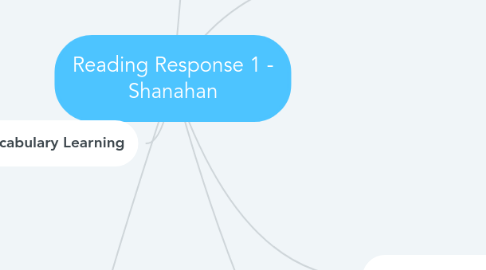
1. Why does disciplinary literature matter?
1.1. Content area has not made great headway in schools, most likely because it is not an appealing approach to teachers
1.2. Using content areas can seem ill-fitting into the actual content of the class for a science or mathematics teacher
1.3. Teachers are motivated by their students success, incorporating content area literacy can make too small of an effect for teachers to really take notice
1.4. Disciplinary literacy holds more promise because it draws from the content area itself, not a broad subject
1.5. Disciplinary literacy can guide students to think beyond the text and grasp deeper and more sophisticated subjects
1.6. Disciplinary strategies are also more attractive to teachers because it can help a broad range of students where content tends to just help students that are below proficient level of reading
2. Contrasts in Vocabulary Learning
2.1. Major assumption that students learn vocabulary similarily in all content areas, and teachers are taught to make connections between different content areas -- but this differs in disciplinary literature
2.2. Focus on the how and why using analysis in disciplinary literature instead of the generic organization of words and mnemonics to remember words in content literacy
2.3. Language between secondary science, history, and mathematics has differences in more than just vocab -- points of view, attributes of causation and agency, passive and active voice, among other differences outlines the differences in reading between the subjects
2.4. Ex. science may focus on nomalization in their vocabulary, wheres history may focus on human agency instead
3. Being aware of the author
3.1. Students must always read history with an eye to the author, but never read mathematics that way, reflect on the authorship sparingly in science reading, and interpret the author during literature reading
3.2. Disciplinary literacy is to identify all reading and writing relevant among the disciplines and to teach students to negotiate the literacy aspects of the disciplines successfully
4. What is disciplinary literature?
4.1. Infusing literacy content into all content areas
4.2. The ability to use reading or writing to learn subject matter in a given discipline
4.3. Reading "should be taught mainly in the subject fields with regular content materials and regular daily lessons
5. Distinguishing disciplinary literacy from content area literacy
5.1. Content area literacy --> study skills that help students learn from subject matter specific texts
5.1.1. Content literacy has been around longer
5.1.2. Prescribes study techniques and unique approaches
5.1.3. Content area is generic reading skills that will boost all disciplines
5.1.4. Nothing is really specialized by content area, its all generally the same
5.2. Disciplinary literacy --> emphasis on knowledge and abilities possessed by those who create, communicate, and use knowledge within the disciplines
5.2.1. Description of unique uses and implications of literacy
5.2.2. Different purposes and different ways of reading depending on the content area
5.2.3. Disciplinary literacy is a newer idea
6. Sources of disciplinary literacy
6.1. Functional linguistics
6.1.1. Concerned with the choices made available to language users by a grammar, this associates speakers and writers intentions with grammar. It considers contextualizing and practical uses of grammar making it useful for all different content areas
6.2. History of content and disciplinary literacy
6.2.1. Content area reading has played a role in the development of disciplinary literacy and pointed towards literacy processes specialized to particular disciplines while fostering a different approach based on generalized learning processes that could easily adapted and used across different content areas
6.3. Expert reader studies
6.3.1. Studies where people proficient in their subjects are asked to observe as experts do what they are supposed to while talking out loud, drawing on the expert-novice paradigm
